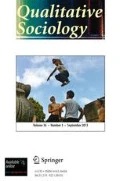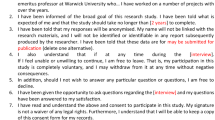Abstract
This article presents an analysis of the Canadian ethics review process by a member of a Research Ethics Board. The author suggests that the new formal system for regulating the ethical conduct of scholarly research is experiencing a form of “ethics creep.” This is characterized by a dual process whereby the regulatory system is expanding outward to incorporate a host of new activities and institutions, while at the same time intensifying the regulation of activities deemed to fall within its ambit. These tendencies are demonstrated through an analysis of: 1) the scope of research ethics protocols, 2) the concept of “harm” employed by these boards, 3) the use of informed consent provisions, and 4) the presumption that research participants will remain anonymous. To accentuate the nature of this ethics creep, comparisons are made between the ways in which identical knowledge generation activities are governed within journalism and the academy. The conclusion suggests that one effect of the increasingly formalized research ethics structure is to rupture the relationship between following the rules and acting ethically. Some of the reasons for this “creep” are highlighted along with the risks that it poses for scholarship.
Similar content being viewed by others
REFERENCES
Adler, P. A., & Adler, P. (2002). Do university lawyers and the police define research values? In W. C. van den Hoonaard (Ed.), Walking the tightrope: Ethical issues for qualitative researchers (pp. 34–42). Toronto: University of Toronto Press.
Allen, C. (1997). Spies like us: When sociologists deceive their subjects. Lingua Franca, 7, 31–39.
Annas, G., & Grodin, M. (Eds.) (1992). The Nazi doctors and the Nuremburg Code: Human rights in human experimentation. New York: Oxford.
Bauman, Z. (1993). Postmodern ethics. Oxford: Blackwell.
Beck, U. (1992). Risk society: Towards a new modernity. London: Sage.
Beecher, H. E. (1966). Ethics and clinical research. NewEngland Journal of Medicine, 274, 1354–1360.
Bok, S. (1978). Lying: Moral choice in public and private life. New York: Vintage.
Douglas, M. (1986). Risk acceptability according to the social sciences. London: Routledge and Kegan Paul.
Erikson, K. T. (1967). A comment on disguised observation in sociology. Social Problems, 14, 366–373.
Erikson, K. T. (1976). Everything in its path: Destruction of community in the Buffalo Creek flood. New York: Simon and Schuster.
Fadan, R., & Beauchamp, T. (1986). A history and theory of informed consent. New York: Oxford University Press.
Galanter, M. (1992). Law abounding: Legalisation around the North Atlantic. Modern Law Review, 55, 1–24.
Haggerty, K. D. (2003). From risk to precaution: The rationalities of personal crime prevention. In R. V. Ericson & A. Doyle (Eds.), Risk and morality (pp. 193–214). Toronto: University of Toronto Press.
Howard, P. K. (1994). The death of common sense: How law is suffocating America. New York: Random House.
Humphreys, L. (1970). Tearoom trade: Impersonal sex in public places. Chicago: Aldine.
Innes, M. (2001). Control creep. Sociological Research Online. Retrieved form http://www. socresonline.org.uk/6/3/innes.html.
Kellner, F. (2002). Coping with guidelines from the Tri-Council. In van den Hoonaard (Ed.), Walking the tightrope (pp. 26–33).
Kitchin, H. A. (2002). The Tri-Council on cyberspace: Insights, oversights and extrapolations. In van den Hoonaard (Ed.), Walking the tightrope (pp. 160–174).
Korn, J. H. (1997). Illusions of reality: A history of deception in social psychology. New York: SUNY.
Marx, G. T. (1988). Undercover: Police surveillance in America. Berkeley: University of California Press.
McNally, R. J. (2003). Remembering trauma. Cambridge, MA: Harvard University Press.
Milgram, S. (1974). Obedience to authority. New York: Harper & Row.
Palys, T., & Lowman, J. (2000). Ethical and legal strategies for protecting confidential research information. Canadian Journal of Law and Society, 15, 39–80.
Scarce, R. (1994). (No) trial (but) tribulations: When courts and ethnography conflict. Journal of Contemporary Ethnography, 23, 123–149.
Shea, C. (2000). Don't talk to the humans: The crackdown on social science research. Lingua Franca, 10, 26–34.
Steadman Rice, J. (1996). Appendix A: Methodology. In J. Steadman Rice (Ed.), A disease of one's own: Psychotherapy, addiction, and the emergence of co-dependency (pp. 219–228). New Brunswick: Transaction.
Sunstein, C. (2002). Risk and reason. Cambridge, UK: Cambridge University Press.
van den Hoonaard, W. (2001). Is research-ethics review a moral panic? Canadian Review of Sociology and Anthropology, 38, 19–36.
van den Hoonaard, W. (Ed.). (2002). Walking the tightrope: Ethical issues for qualitative researchers. Toronto: University of Toronto Press.
Wax, M. L. (1980). Paradoxes of “consent” to the practice of fieldwork. Social Problems, 27, 272–283.
Weber, M. (1978). Economy and society. Berkeley: University of California Press.
Zhou, X. (1993). The dynamics of organizational rules. American Journal of Sociology, 98, 1134–1136.
Zimbardo, P. G. (1973). On the ethics of intervention in human psychological research: With special reference to the Stanford Prison experiment. Cognition, 2, 243–256.
Author information
Authors and Affiliations
Corresponding author
Rights and permissions
About this article
Cite this article
Haggerty, K.D. Ethics Creep: Governing Social Science Research in the Name of Ethics. Qualitative Sociology 27, 391–414 (2004). https://doi.org/10.1023/B:QUAS.0000049239.15922.a3
Issue Date:
DOI: https://doi.org/10.1023/B:QUAS.0000049239.15922.a3




